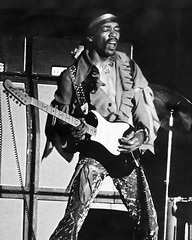It is in the music industry’s best interests to find a solution to the problem of classifying musical genres.
Inaccurate Musical Genres
When R.E.M. was climbing the charts, they were referred to as an Alternative band. Now they’re just a rock band. U2 first emerged during the New Wave era and their sound fit in that category but now they’re just a rock band. Progressive music used to refer to seventies bands like Yes and Emerson Lake & Palmer, now you’ve got Progressive Rock and Metal, Progressive Trance and House, and even Progressive Bluegrass. Alternative has splintered into Alternative Punk and Metal, Alternative Country and Hip Hop and Synth.
The Problem Of Multiple Musical Genres
Then there’s the problem of musicians/composers/bands whose music falls into multiple genres. Jimi Hendrix‘s music is Blues, Psychedelic Rock, and Heavy Metal. Led Zeppelin and Black Sabbath were both Blues, Hard Rock, and Heavy Metal bands. The aforementioned Emerson, Lake & Palmer’s progressive rock sound included elements of Jazz and Classical Music.
Meaningless Musical Genres
Finally, the current practice of labeling some genres of music with time-specific appellations such as neo and post; Post-Punk, for example. That type of labeling quickly becomes meaningless or unpractical when a following musical movement reacts to the current one. Does the following Punk movement, then, become the Post-Post-Punk genre? Clearly, that doesn’t work.
The Benefit Of A Workable Musical Classification System
A better musical genre classification system would help sell more music because it would make specific types of music easier to discover. It seems to me that technologies such as portable MP3 players like the iPod, music download stores like iTunes, music sharing and discovery services like Last.fm that can all be tied together with tagging and RSS, can offer at least part of the solution.
Current Technological Limitations
I’ve been thinking of this topic because of my frustration with creating accurate playlists in iTunes. Let’s say I want to create a playlist of my Blues songs but all my Jimi Hendrix songs are classified as within the Psychedelic Rock genre. Because of this, I will not have Hendrix’s version of Red House, one of my favorite versions of one of my favorite blues tunes.
How about podcasts? Why can’t I label my podcasts as not only podcasts but also new and video or Internet marketing? That way, I could have a playlist of only my news podcasts that are in video format or a playlist of only my Internet marketing podcasts. That would be extremely handy for those of us who subscribe to a lot of podcasts.
Part of the problem is the inflexibility of the current technology. Why can’t I apply multiple genres to an MP3 file in either iTunes or to the metadata of the file itself?
A More Accurate Genre Classification System
The other, more difficult part of the problem is in the method by which we classify musical genres, which, I suspect, has more to do with musical media than anything else. Perhaps the mess that has become of categories of music is a result of the disintegration and dispersion of media. When traditional radio stations and mainstream musical media go online and you throw in online only musical publications, web radio, and MP3 blogs, you no longer have just a handful of sources from which to learn about musical genres.
So how do we arrive at a consensus on whose music belongs to what genre?
I don’t know that it is the answer but it may very well be a big part of the answer: Why not harness the wisdom of crowds?
Apple’s iPod/iTunes Tag Cloud
As the overwhelming online music market leader with it’s iPod player and iTunes online music store, Apple is in a better position than anyone to revamp the genre classification system. I’d like to see smart developers world wide use the iTunes API to create some tag cloud functionality (for which Apple might need to expand the API).
Specifically, I’d like to see a public tag cloud(s) that display tags for the songs, albums, bands, and genres of the aggregate iTunes userbase that you could filter by year, user rating, play count over a given time period, and last played.
I’d also like to see my own iPod/iTunes tag cloud that I could chose whether or not to share.
With such a system, crowdsourcing will most likely arrive at, if not the most accurate, then the most popular genres applied to a given band and/or song.
It would be nice to have the option of applying the public tag cloud to my music library, if I want.
Music Relationship Engine
If you combined this tag cloud data to the iTunes relationship engine and put it out on the web, Apple could monetizing the tag cloud by offering iTune links to specific bands and musicians and albums and songs.
The user rating, play count and last played data could be the foundation of a popularity engine, which would also serve as a music discovery engine.
Such a system would vastly improve the functionality of the iPod while also helping drive sales.
The e-Strategy Academy covers all aspects of digital marketing including search optimization & marketing, email marketing, social media marketing, video marketing, mobile marketing & public relations.

